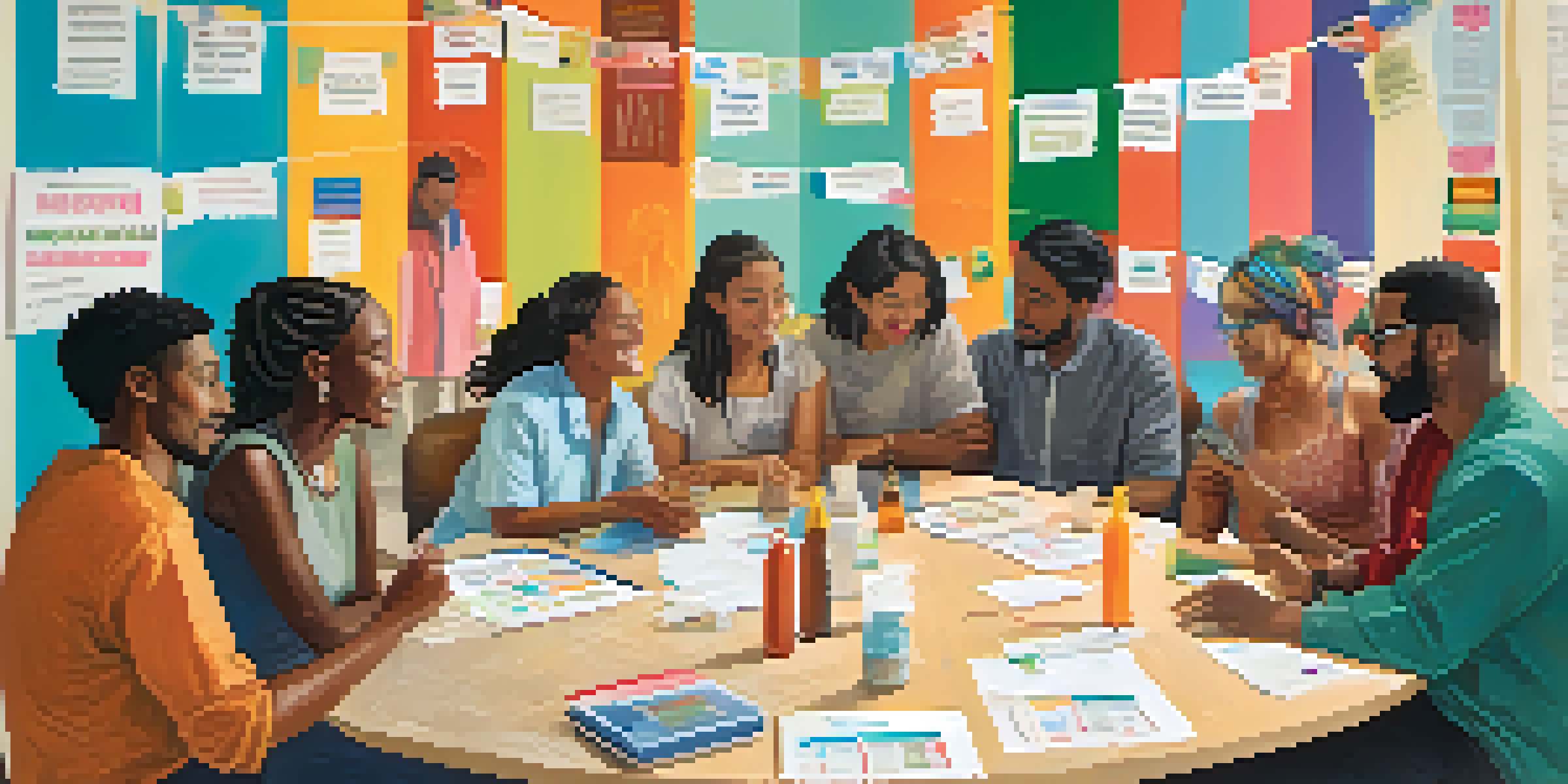Cultural Influences on Attitudes Towards Vaccination

Understanding Cultural Context in Vaccination Attitudes
Culture plays a significant role in shaping how communities view health practices, including vaccination. Different societies bring unique beliefs and values to the table, influencing their acceptance of vaccines. For instance, in some cultures, traditional medicine is highly regarded, which can sometimes clash with modern medical practices, including immunization.
Vaccination is a simple thing, but it has a profound impact on public health.
These cultural attitudes can stem from historical experiences with healthcare systems, trust in medical professionals, and societal norms. When a community has a history of negative interactions with healthcare, it may lead to skepticism about vaccines. Understanding this context is crucial for public health officials aiming to increase vaccination rates.
Moreover, cultural narratives and stories passed down generations can reinforce or challenge the acceptance of vaccines. By recognizing these narratives, we can better tailor communication strategies that resonate with different cultural backgrounds, ultimately promoting better health outcomes.
Religious Beliefs and Vaccination Acceptance
Religious beliefs often intersect with attitudes toward vaccination, influencing whether individuals feel comfortable receiving immunizations. Some faiths may have doctrines that either discourage or encourage the use of vaccines, contributing to varying levels of acceptance. For example, certain groups may oppose vaccines based on beliefs in divine healing or mistrust in human intervention.

Conversely, many religious communities advocate for vaccination as a means of protecting the vulnerable and fulfilling moral obligations. This duality highlights the importance of engaging religious leaders and communities in conversations about vaccine benefits, as they can be powerful advocates for health.
Culture Shapes Vaccine Attitudes
Cultural beliefs and historical experiences significantly influence community acceptance of vaccines.
Ultimately, recognizing and respecting these beliefs is essential for public health campaigns. By fostering dialogue with religious communities, health officials can create a more inclusive approach that respects diverse perspectives while promoting vaccination.
Socioeconomic Factors Influencing Vaccination Attitudes
Socioeconomic status significantly influences attitudes towards vaccination. Individuals from lower socioeconomic backgrounds may face barriers such as lack of access to healthcare, financial constraints, or misinformation. These challenges can result in lower vaccination rates in certain populations, perpetuating health disparities.
The greatest weapon against stress is our ability to choose one thought over another.
On the other hand, those with higher socioeconomic status may have more access to information and healthcare resources, potentially leading to higher vaccination rates. However, this group can also fall prey to misinformation spread through social media, which can sway their attitudes negatively.
Addressing these socioeconomic disparities is crucial for improving vaccination rates. Public health initiatives must focus on educating underserved communities while providing accessible vaccination services to ensure everyone has the opportunity to protect themselves and their families.
The Impact of Education on Vaccination Perspectives
Education plays a pivotal role in shaping individuals' attitudes toward vaccination. Higher levels of education often correlate with better understanding and acceptance of vaccines, as educated individuals are more likely to seek out reliable information. This understanding can empower them to make informed choices about their health.
However, education alone isn’t a panacea. Misinformation, especially on digital platforms, can still influence even the most educated individuals. The challenge lies in distinguishing between credible sources and misleading information, which can lead to confusion and hesitancy about vaccination.
Education Enhances Vaccine Understanding
Higher education levels correlate with better vaccine acceptance, but misinformation can still create hesitancy.
To combat this issue, educational campaigns should not only provide accurate information but also teach critical thinking skills. Equipping individuals with the tools to discern credible information can encourage informed decisions regarding vaccination, ultimately benefiting public health.
Media Representation and Its Effects on Vaccination Attitudes
The media plays a crucial role in shaping public perception of vaccination. Positive coverage can bolster public confidence, while negative portrayals can fuel skepticism and hesitancy. For example, sensationalized stories about vaccine side effects can lead to widespread fear, overshadowing the benefits of vaccination.
Additionally, the rise of social media has transformed how information spreads, allowing both accurate and misleading narratives to circulate rapidly. Influencers and celebrities can sway public opinion, either positively or negatively, further complicating the landscape of vaccination attitudes.
To ensure responsible media representation, it's essential for journalists and content creators to prioritize factual reporting and highlight the expertise of medical professionals. By promoting balanced narratives, the media can help foster a more informed public regarding vaccination.
Community Engagement and Trust Building for Vaccination
Building trust within communities is vital for improving vaccination rates. Grassroots efforts that engage local leaders and influencers can enhance community buy-in and acceptance. When health initiatives come from within the community, they are often met with greater trust and openness.
Moreover, creating forums for open dialogue allows community members to express their concerns and questions about vaccines. This two-way communication fosters a sense of ownership and collaboration, making individuals more receptive to vaccination efforts.
Trust is Key for Vaccination Uptake
Building trust through community engagement and transparent communication is essential for improving vaccination rates.
Ultimately, trust-building efforts should focus on transparency and empathy, acknowledging the diverse concerns people may have. When individuals feel heard and respected, they are more likely to engage with vaccination programs positively, leading to better public health outcomes.
Cultural Competence in Vaccination Efforts
Cultural competence is essential for public health officials working to increase vaccination rates. This means understanding and respecting the diverse cultural backgrounds of communities, which can significantly affect attitudes towards vaccines. Tailoring vaccination campaigns to reflect cultural values and norms can lead to more effective outreach.
For instance, using culturally relevant messaging and involving community leaders in vaccination initiatives can help bridge the gap between healthcare providers and communities. By prioritizing cultural competence, health officials can create more relatable and impactful campaigns that resonate with specific populations.

Furthermore, ongoing training in cultural competence for healthcare providers is crucial. This training can enhance communication skills and foster better relationships with patients, ultimately promoting trust and collaboration in vaccination efforts.